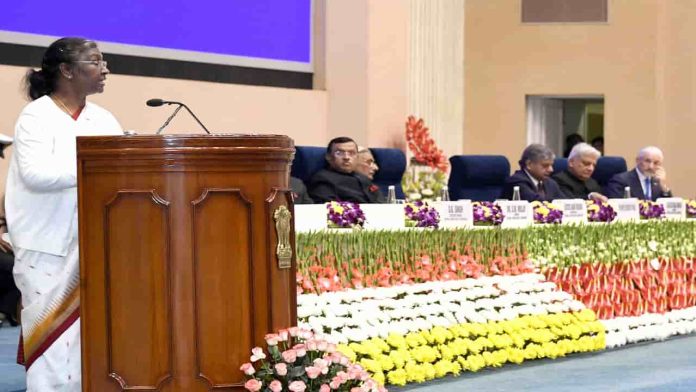By India Legal Bureau
President Droupadi Murmu appealed to the National Human Rights Commission (NHRC) to look into the criminal justice system and ensure the rights of the undertrials are protected. Inaugurating the 74th Human Rights Day celebrations organised by the NHRC, President Murmu hailed the NHRC’s initiatives against child labour and for the promotion of rights of the disabled and the LGBTQ. She noted that the NHRC, now in its 30th year, was making best possible efforts to spread awareness on protection and promotion of human rights.
President Murmu noted that the world observes December 10 as Human Rights Day every year to mark the adoption of the Universal Declaration of Human Rights (UDHR) by the United Nations General Assembly (UNGA) in 1948.
She said the declaration has been translated in more than 500 languages across the world, making it the most translated document in history. Recalling the key role of social activist and reformer Hansa Mehta, the only woman delegate to the United Nations Commission on Human Rights in 1947-48, the president said Mehta changed the phrase “All men are born free and equal” to “All human beings are born free and equal” in Article 1 of the Universal Declaration of Human Rights. Though this may sound like a minor correction, it had a major impact on the situation of women across the world. President Murmu said Hansa Mehta thus played an important role in drafting the UDHR.
Despite the Universal Declaration of Human Rights being around for so many years, President Murmu noted that human rights are still a work in progress in many parts of the world. “When we consider the sad developments that keep taking place in many parts of the world, we wonder if the declaration has been read at all in some of those languages.”
She said the work done by India on promotion and protection of human rights has received international acceptance, including from the Global Alliance of National Human Rights Institutions. Stating that it was important to learn, rather re-learn, to treat Mother Nature with dignity, the president said it was not only the moral duty of all citizens, but was also necessary for the survival of human beings.
President Murmu said one must develop sensitivity towards fellow living beings since it was the key to protection and promotion of rights for all. “It is essentially an exercise of the faculty of imagination. If we can imagine ourselves in the place of those who are treated as less than human, it would open our eyes and compel us to do the needful. There is a so-called ‘golden rule’, which says, “Treat others as you would like them to treat you”. That sums up the human rights discourse beautifully,” the President said.
The president noted that the UN has chosen “Dignity, Freedom and Justice for All” as the theme for 2022. She said that over the past few years, the world has suffered from a large number of natural disasters caused by unusual weather patterns. Climate change is knocking on our doors, President Murmu said. “People in the poorer nations are going to pay a heavier price for the degradation of our environment. We must consider the environmental dimension of justice now,” she said.
The president said the challenge posed by climate change is so enormous that it forces us to redefine “rights”. Five years ago, the High Court of Uttarakhand held that the Ganga and Yamuna rivers have the same legal rights as human beings. India is a land of sacred geography, with countless holy lakes, rivers and mountains. To these landscapes, the flora and fauna add rich biodiversity. “In old times, our sages and seers saw them all as part of a universal whole, along with us. So, just as the concept of human rights exhorts us to consider every human being as no different from us, we should treat the whole living world and its habitat with respect,” President Murmu said.
The President said she wonders what the animals and trees around us would tell us if they could speak, what would rivers say about human history and what would cattle say on the topic of human rights. She said that we have trampled on their rights for long, and now the results are before us.
In his address, NHRC Chairperson Justice Arun Mishra said women worldwide continue to suffer various forms of discrimination due to social, customary and religious practices. The time has come to take care of the same by enacting legislative provisions to remove discrimination in inheritance, property rights, parental rights, domicile of married women, and legal capacity.
Justice Mishra said Article 44 of the Constitution, enabling equality by enacting a common civil code, should not remain a dead letter. Without providing dignity and equal rights to them, a celebration of the day is meaningless, he said.
“Human rights are inalienable. They take place in public discourse. Courts, while interpreting the provisions, remedy violation of rights in accordance with procedure established by law. Freedom from fear, suppression and oppression is essential. The freedom of speech and expression are supreme, which has to be exercised with responsibilities while protecting the dignity of others. Fulfilment of a promise of justice on the ground level is necessary for inclusive growth,” Justice Mishra said.
To ensure justice to all, the system has to build a homogenous and productive society and spread awareness of available legal tools even to vulnerable sections, the NHRC chairperson said.
Justice Mishra said childhood needs to be protected. He noted that children’s rights are being violated with impunity since we take false pride in putting a disproportionate education burden during childhood. The NHRC chief said the commercialisation of education is a cause for concern.


